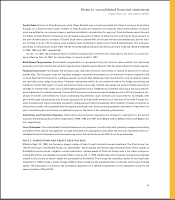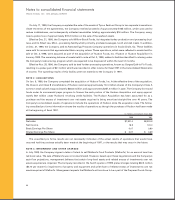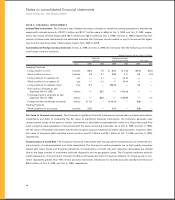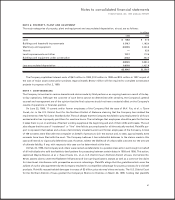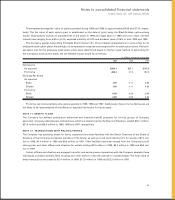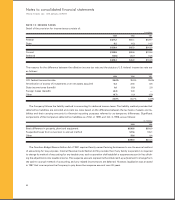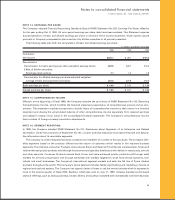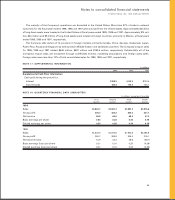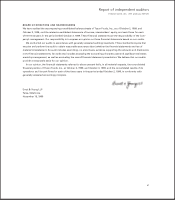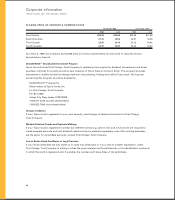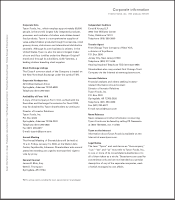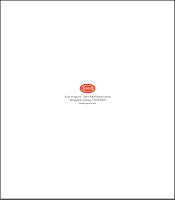Tyson Foods 1999 Annual Report Download - page 55
Download and view the complete annual report
Please find page 55 of the 1999 Tyson Foods annual report below. You can navigate through the pages in the report by either clicking on the pages listed below, or by using the keyword search tool below to find specific information within the annual report.
Notes to consolidated financial statements
TYSON FOODS, INC. 1999 ANNUAL REPORT
53
NOTE 14: EARNINGS PER SHARE
The Company adopted Financial Accounting Standards Board (FASB) Statement No.128, Earnings Per Share, effective
for the year ending Oct. 3, 1998. All prior-period earnings per share data have been restated. This Statement requires
dual presentation of basic and diluted earnings per share on the face of the income statement. Stock options issued
pursuant to Company compensation plans are the only dilutive securities in all periods presented.
The following table sets forth the computation of basic and diluted earnings per share:
in millions, except per share data
1999 1998 1997
Numerator:
Net income $230.1 $««25.1 $185.8
Denominator:
Denominator for basic earnings per share-weighted average shares 229.9 226.7 216.3
Effect of dilutive securities:
Employee stock options 1.1 1.2 1.9
Denominator for diluted earnings per share-adjusted weighted
average shares and assumed conversions 231.0 227.9 218.2
Basic earnings per share $««1.00 $««0.11 $««0.86
Diluted earnings per share $««1.00 $««0.11 $««0.85
NOTE 15: COMPREHENSIVE INCOME
Effective at the beginning of fiscal 1999, the Company adopted the provisions of FASB Statement No.130, Reporting
Comprehensive Income, which modifies the financial statement presentation of comprehensive income and its com-
ponents. This statement requires companies to classify items of comprehensive income by their nature in a financial
statement and display the accumulated balance of other comprehensive income separately from retained earnings
and capital in excess of par value in the consolidated financial statements. The Company’s comprehensive income
item consists of foreign currency translation adjustments.
NOTE 16: SEGMENT REPORTING
In 1999, the Company adopted FASB Statement No.131, Disclosures about Segments of an Enterprise and Related
Information. Under the provisions of Statement No.131, a public business enterprise must report financial and descrip-
tive information about its reportable segments.
The Company is a fully-integrated producer, processor and marketer of a variety of food products. The Company iden-
tifies segments based on the products offered and the nature of customers which results in five reported business
segments: Food Service, Consumer Products, International, Swine and Seafood. Food Service includes fresh, frozen and
value-enhanced poultry products sold through food service and specialty distributors who deliver to restaurants, schools
and other accounts. Consumer Products include fresh, frozen and value-enhanced poultry products sold through retail
markets for at-home consumption and through wholesale club markets targeted to small food service operators, indi-
viduals and small businesses. The Company’s international segment markets and sells the full line of Tyson chicken
products throughout the world. The Company’s swine segment includes feeder pig finishing and marketing of swine to
regional and national packers. The Company has signed a letter of intent to sell the swine business which is expected to
close in the second quarter of fiscal 2000. Seafood, which was sold on July 17, 1999, includes branded surimi-based
seafood offerings, such as analog crabmeat, lobster, shrimp and scallops marketed both domestically and internationally.


